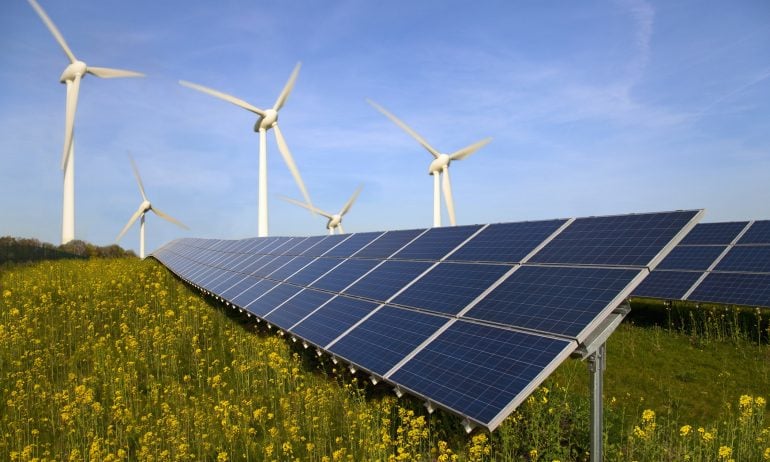7 Best-Performing Utility Stocks of February 2026
Utility stocks are less volatile and more dependable, especially during difficult times.

Many, or all, of the products featured on this page are from our advertising partners who compensate us when you take certain actions on our website or click to take an action on their website. However, this does not influence our evaluations. Our opinions are our own. Here is a list of our partners and here's how we make money.
The investing information provided on this page is for educational purposes only. NerdWallet, Inc. does not offer advisory or brokerage services, nor does it recommend or advise investors to buy or sell particular stocks, securities or other investments.
Utility stocks often pay dividends and may help stabilize your portfolio.
Utility stocks may not offer huge growth opportunities.
Utilities provide heat, water and other services to homes, schools and businesses. Because utilities are a necessity, stocks in this sector may be less susceptible to economic downturns. Some utilities pay out dividends, supplying investors with additional income. Many utilities are regulated by federal or municipal governments, making them potentially more stable than other sectors.
7 Best-performing utility stocks
Here are seven of the best-performing utility stocks in the S&P 500.
Utility stock pros
Regular dividends
Consistently paid dividends are a big advantage of utility companies. Check out a company’s dividend-paying history to get a sense of how stable those payments are.
» Curious? Learn how to buy dividend stocks
Diversification
Adding utility stocks may help you diversify your portfolio. Diversification is an investment strategy that entails investing in a variety of investments across sectors, company sizes and geography. A well-diversified portfolio can help reduce risk: If one company or sector is performing poorly, the other investments may help buoy your overall portfolio.
Brokerage firms | |
|---|---|
Stabilization
Because utilities are a necessity, they may act as a stabilizing force in otherwise turbulent markets. Utilities outperformed the larger market ahead of the 2001 and 2007-2009 recessions. As worries of a recession rise in 2025, we can look back at 2022 as an example of when utilities performed well despite similar economic concerns.
» More on preparing for a recession: What are the closest things to recession-proof stocks?
Utility stock cons
Changing landscape
Though the shift to clean energy creates a big opportunity for the energy sector, it presents some challenges as established companies try to venture into new technologies. Businesses will also need to cope with changing government regulations. There will likely be some companies that aren’t able to rise to the challenge of going green.
Environmental concerns
For the companies that don’t heavily shift toward clean energy (and even for those that do), environmental concerns are becoming increasingly important to investors. Environmental, social and governance (ESG) criteria are being used more widely to assess a company’s climate risk and impact. Some sectors can easily skirt those concerns, but utility companies may be under tougher scrutiny.
Low growth
Utility stocks’ dividends are dependable and consistent — but these stocks don’t often present huge opportunities for growth. Instead, utilities provide steady income, making them attractive to some investors. That being said, with energy demand rising due to artificial intelligence, Fidelity predicts utilities have the potential to drive significant growth.
» Looking for growth opportunities? Learn more about tech stocks
How to buy utility stocks
To purchase any stocks, you’ll need to open an investment account. Investment accounts come in many forms. Some, such as retirement accounts like Roth or traditional IRAs, offer tax benefits. Taxable brokerage accounts do not, but they offer more flexibility.
» Need more information? Learn more about the types of investment accounts
Once you know what type of investment account you want to open, you’ll need to find an online broker at which to do so. Some brokerages have cheaper fees than others; some have advanced investment analysis. (Learn how to weigh these factors and choose the best online broker.)
After you have an investment account, you can fund it just like a bank account. From there, you’ll be able to use your broker’s screening tools to find utility stocks to invest in.
Energy ETFs: An easier way to invest
If buying individual utility stocks seems risky or challenging, you can consider energy exchange-traded funds (ETFs). These funds are baskets of stocks and other investments you can buy together, providing instant diversification. Energy ETFs contain investments focused on energy creation, production and distribution. Keep in mind that while ETFs are more diversified than individual stocks, they are not without risk and their value can still fluctuate.
NerdWallet rating 4.8 /5 | NerdWallet rating 4.5 /5 | NerdWallet rating 5.0 /5 |
Fees $0 per online equity trade | Fees $0 per trade. Other fees apply. | Fees $0 per trade for online U.S. stocks and ETFs |
Account minimum $0 | Account minimum $0 | Account minimum $0 |
Promotion None no promotion available at this time | Promotion Get up to $1,000 when you open and fund an E*TRADE brokerage account. Terms apply. | Promotion None no promotion available at this time |
Methodology
To find the best-performing utility stocks, we screened U.S. companies that are included in the "Utilities" sector. These include independent power producers, diversified utilities and regulated electric, gas and water utilities.
Neither the author nor editor held positions in the aforementioned investments at the time of publication.
On this page
On this page











